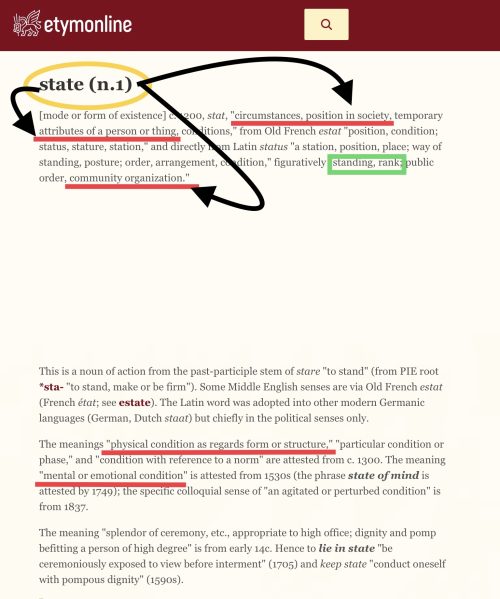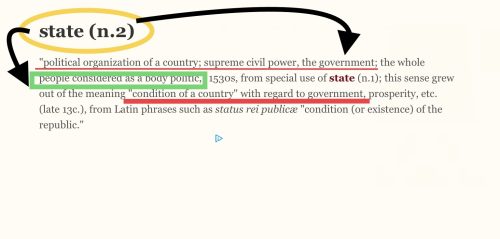The Capillary Wave: Word Index

What the state is, is extremely important in terms of law and governance, and in terms of your person-al life.
- Word Index: Person
The definition of this important word tells us much about how the state apparatus operates against you as one of its citizens. If you are a citizen “of” the state, you belong “to” the state.
That small word: “of” is minuscule yet essential to understanding where you stand in relation to the body politic commonly known as your “country”. For example, the UNITED KINGDOM (UK) , USA, and AUSTRALIA are what is known at law as a body politic. The body politic/ legal person: the UK, is separate and distinct from the natural landmass: Britain, as is the same at America (the landmasss)in relation to the USA (the body politic).
To understand more about these very important aspects of law, and why the words of those countries above have been capitalised, take a look at my article: The Framework Of Law And Governance. The article is essential reading for citizens looking to understand how law and governance works, and how it affects you.
If some thing is “of” some thing, then it is “from” some thing, and is therefore “created” by that thing”. There is a maxim of law that states:
- The power which is derived cannot be greater than that from which it is derived.
The meaning of the maxim is; the creation can never be greater than its creator. The Bible (which is where these maxims of law originate) puts it like this:
- Romans 1:25, KJV 1611 – Who changed the truth of God into a lie, and worshipped and served the creature more than the Creator, who is blessed for ever. Amen.
If you are a citizen of the state, then the state will always have the upper hand in that relationship, because the state citizen is “of” the state, created “by” the state, and by definition belongs “to” the state.
A citizen of the state, belongs to the state and that is also evidenced here:
- Word Index: Secular


“The state” is concerned with all things to do with the body politic, which is a country, which is a “legal person”; and the organisation of its persons within its society.
- Word Index: Country
A country is a body politic which is what it sounds like; a political body. For further and deeper exploration here is an interesting read with further analysis on the definition of the state.
This paper: A DEFINITION OF THE STATE is written by CHANDRAN KUKATHAS and published in University of Queensland Law Journal, Vol 33, Issue 2, 2014, Pages 357–366
Some excerpts:
- The state should not be viewed as a form of association that subsumes or subordinates all others. 2) The state is not an entity whose interests map closely onto the interests of the groups and individuals that fall under its authority, but has interests of its own. 3) The state is, to some extent at least, an alien power; though it is of human construction, it is not within human control. 4) The state is not there to secure people’s deepest interests, and it does not serve to unify them, reconcile them with one another, bring their competing interests into harmony, or realise any important good – such as justice, freedom, or peace. While its power might be harnessed from time to time, that will serve the interests of some, not the interests of all. 5) The state is thus an institution through which individuals and groups seek to exercise power (though it is not the only such institution); but it is also an institution that exercises power over individuals and groups. 6) The state is, ultimately, an abstraction, for it has no existence as a material object, is not confined to a particular space, and is not embodied in any person or collection of persons. The state exists because certain relations obtain between people; but the outcome of these relations is an entity that has a life of its own – though it would be a mistake to think of it as entirely autonomous – and to define the state is to try to account for the entity that exists through these relations…
- …A state is a form of political association or polity that is distinguished by the fact that it is not itself incorporated into any other political associations, though it may incorporate other such associations. The state is thus a supreme corporate entity because it is not incorporated into any other entity, even though it might be subordinate to other powers (such as another state or an empire). One state is distinguished from another by its having its own independent structure of political authority, and an attachment to separate physical territories. The state is itself a political community, though not all political communities are states. A state is not a nation, or a people, though it may contain a single nation, parts of different nations, or a number of entire nations. A state arises out of society, but it does not contain or subsume society. A state will have a government, but the state is not simply a government, for there exist many more governments than there are states…
- …Though a state may be a political community, it need not be. Yet it must always be an association: a collectivity with a structure of authority and a capacity for agency. What usually gives expression to that capacity is the state’s government. Government and the state are not however, the same thing. States can exist without governments and frequently exist with many governments. Not all governments have states. Australia, for example, has one federal government, six state governments, two territorial governments, and numerous local governments.
- Word Index: Legal Fiction
